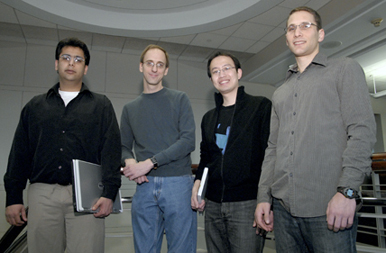Business Under Pressure
BU students compete in strategy at SMG

Fueled by adrenaline, lack of sleep, and a case of Red Bull, four School of Management graduate students will compete for $45,000 in prizes as they race to solve a business problem in 24 hours in the second annual International Tech Strategy Business Case Competition, to be held at SMG from March 29 to 31. Hosted by BU, the competition is sponsored by the Motorola Foundation and organized by BU M.B.A. students, who are responsible for details ranging from marketing to logistics.
“Hosting this competition puts BU out there as one of the premier business schools in the world,” says John Chalykoff, SMG associate dean of academic programs. “It is great to have our students compete with other students of their caliber.”
The team of first-year M.B.A. students, Manish Mahendru (GSM’08), Deron Kohl (GSM’08), James Chien Chen (GSM’08), and Joe Wallerstein (GSM’08), was selected from 20 BU teams participating in a similar, internal Graduate School of Management competition on January 27. The four will face off against 10 invited teams of four students from top management schools, including the Sloan School of Management, the Wharton School, the Stanford Graduate School of Business, the Kellogg Graduate School of Management, the Indian Institute of Management, and Seoul National University.
The teams must create a solution to a Motorola business problem that involves seamless mobility, such as moving information between home and office or integrating software in cars, but they won’t get any details until the morning of Friday, March 30. After they receive the business case, written by Motorola and BU faculty, teams will sequester themselves in SMG rooms or at their hotel. They will analyze the case and finalize their recommendations, which they will submit to Motorola in a slide show presentation the following morning.
“Some teams will literally sit in the room and not leave until completion,” says Josh Cleveland (GSM’07), chair of the student group organizing the competition. Each one has a different strategy, he says. A team might toss ideas around for a few hours before deciding on one, then work for several hours developing that plan using concepts they have learned in class. “The last couple of hours are spent putting the slide presentation together,” Cleveland says, “and by the time they hand it in, it looks like they’ve been working on it for a semester.”
The hardest part about creating a solution to the case study, according to Mahendru, is predicting what the industry will look like in 5 to 10 years, since a breakthrough can change everything in a matter of months. The BU team plans to define the size of the market and the needs of the customers and to anticipate competitors’ moves, he says.
“I would be pushing the team toward a sleepless night,” says Mahendru. “Four years in undergrad and a year at BU GSM have given us enough practice in being focused despite sleepless nights. And we have ordered a huge crate of Red Bulls to keep us focused.”
On Saturday morning, teams have 20 minutes to present their proposal to a panel of judges — nine Motorola executives and six executives from across the industry — and spend 20 minutes answering questions.
“There’ll be an energetic, positive vibe in the room because the project seems very viable,” says Cleveland, “and then one of the judges will throw out a question about where they got a number in the financial projections, and if they can’t answer, the whole presentation is deflated.”
Besides the challenge of pitting themselves against the best of their peers, the students have good reason to expend so much energy on the competition. In addition to prize money of $25,000 for first place, $15,000 for second place, and $5,000 for third place, the competition offers an opportunity to create a business solution to a real technological issue. The experience can give them an advantage when they graduate. At last year’s competition, Chalykoff says, “Motorola was so impressed with the presentations that they invited the winning teams to their headquarters in Schaumburg, Ill., to present to their executive team.”
Catherine Santore can be reached at csantore@bu.edu.